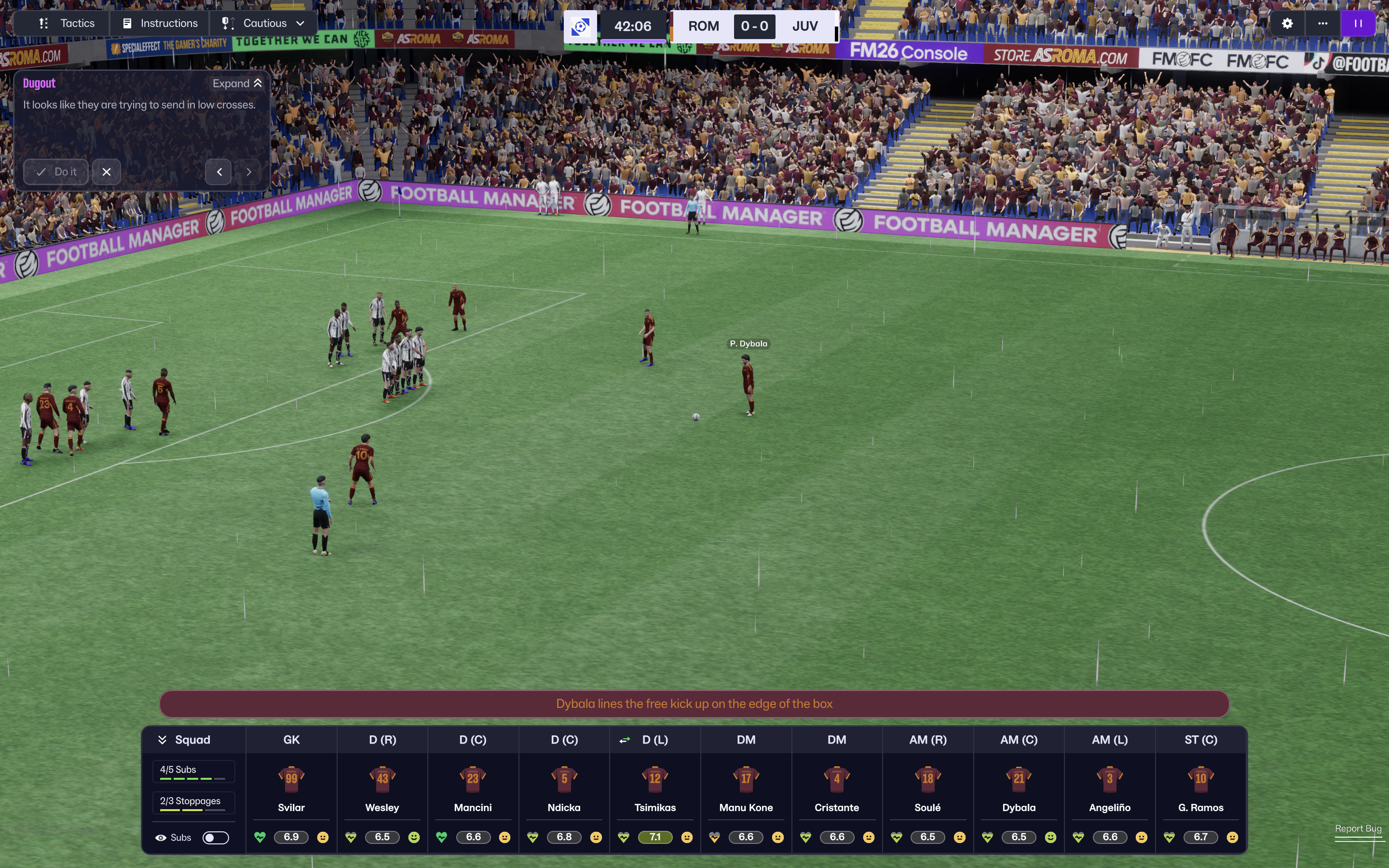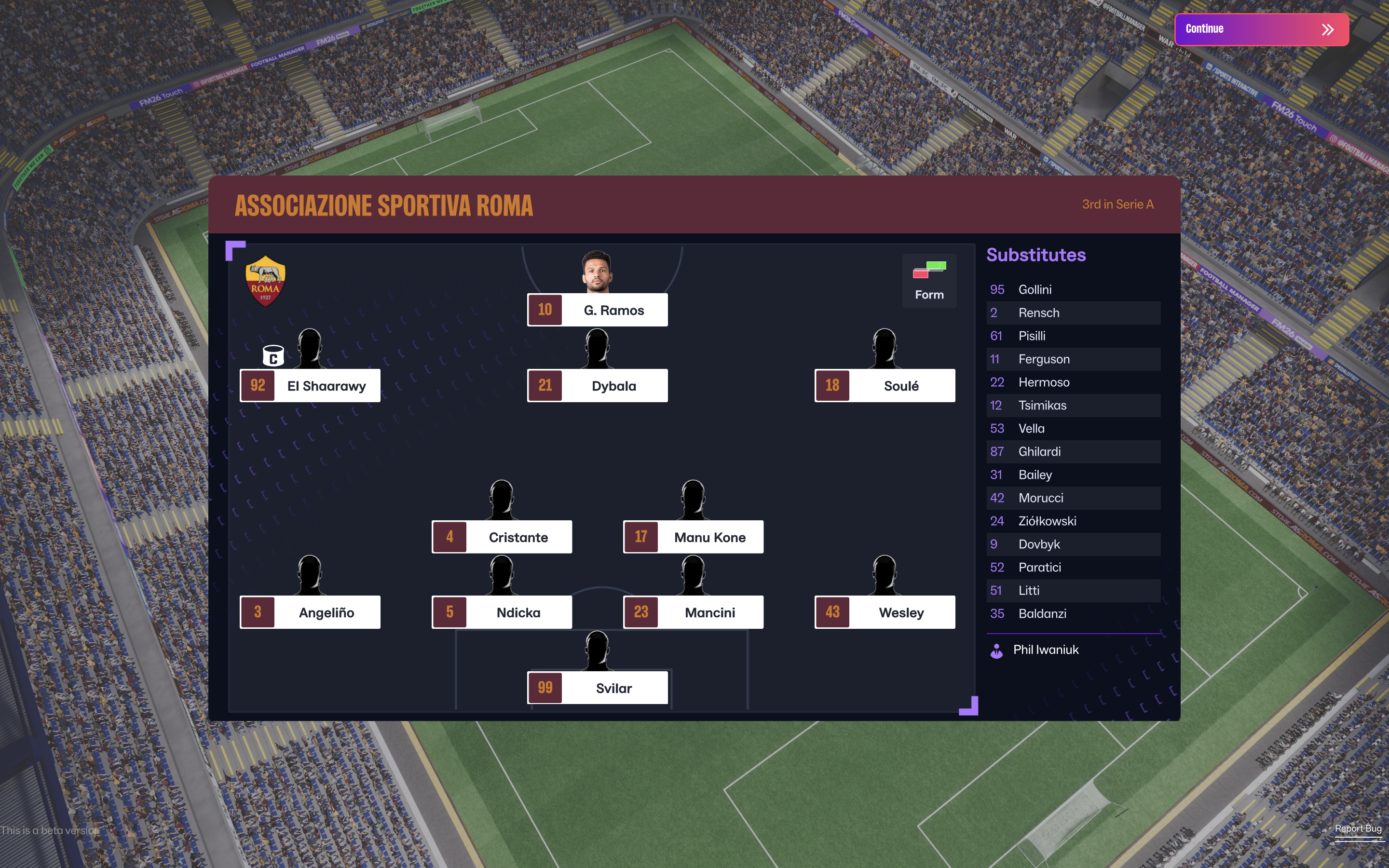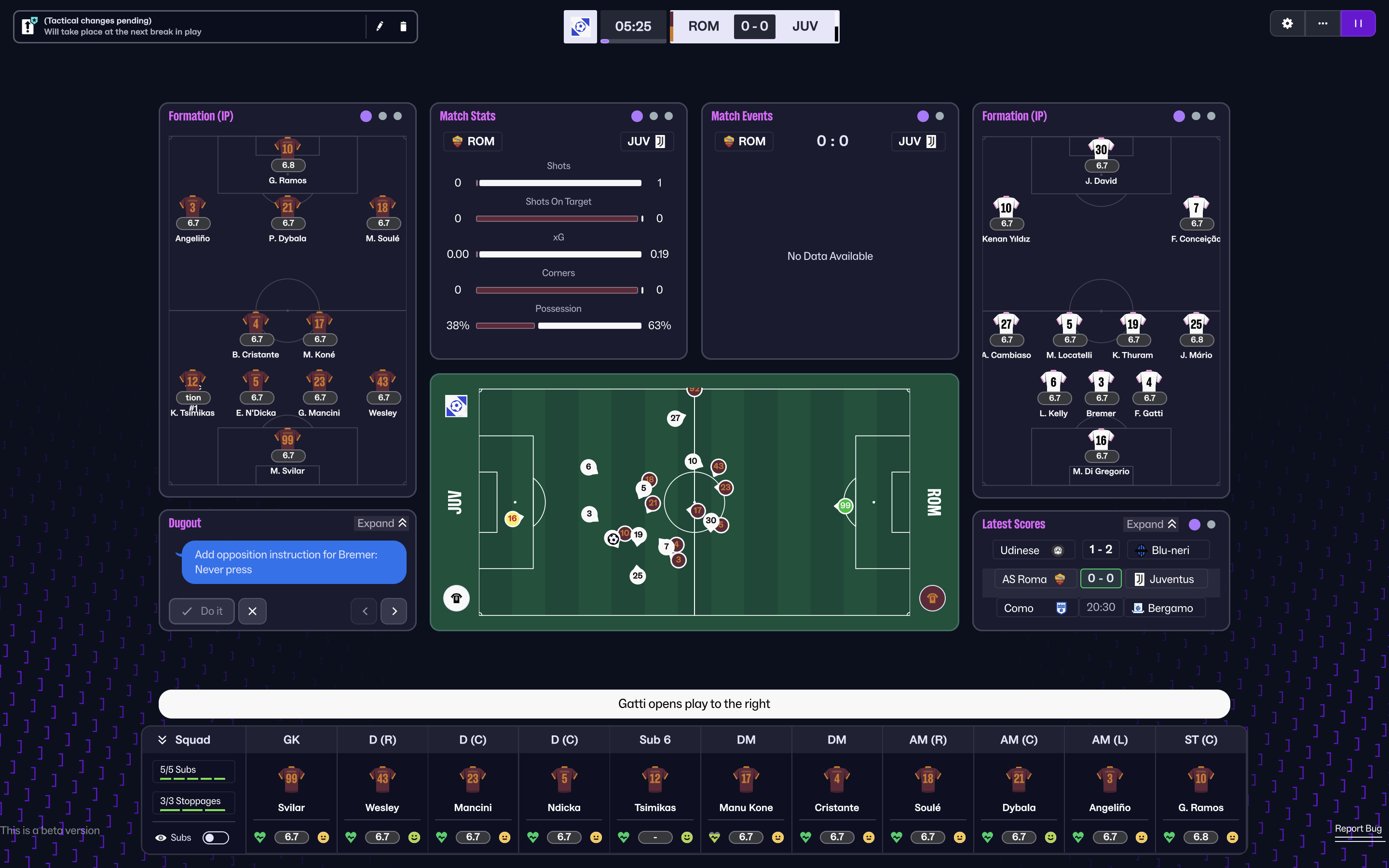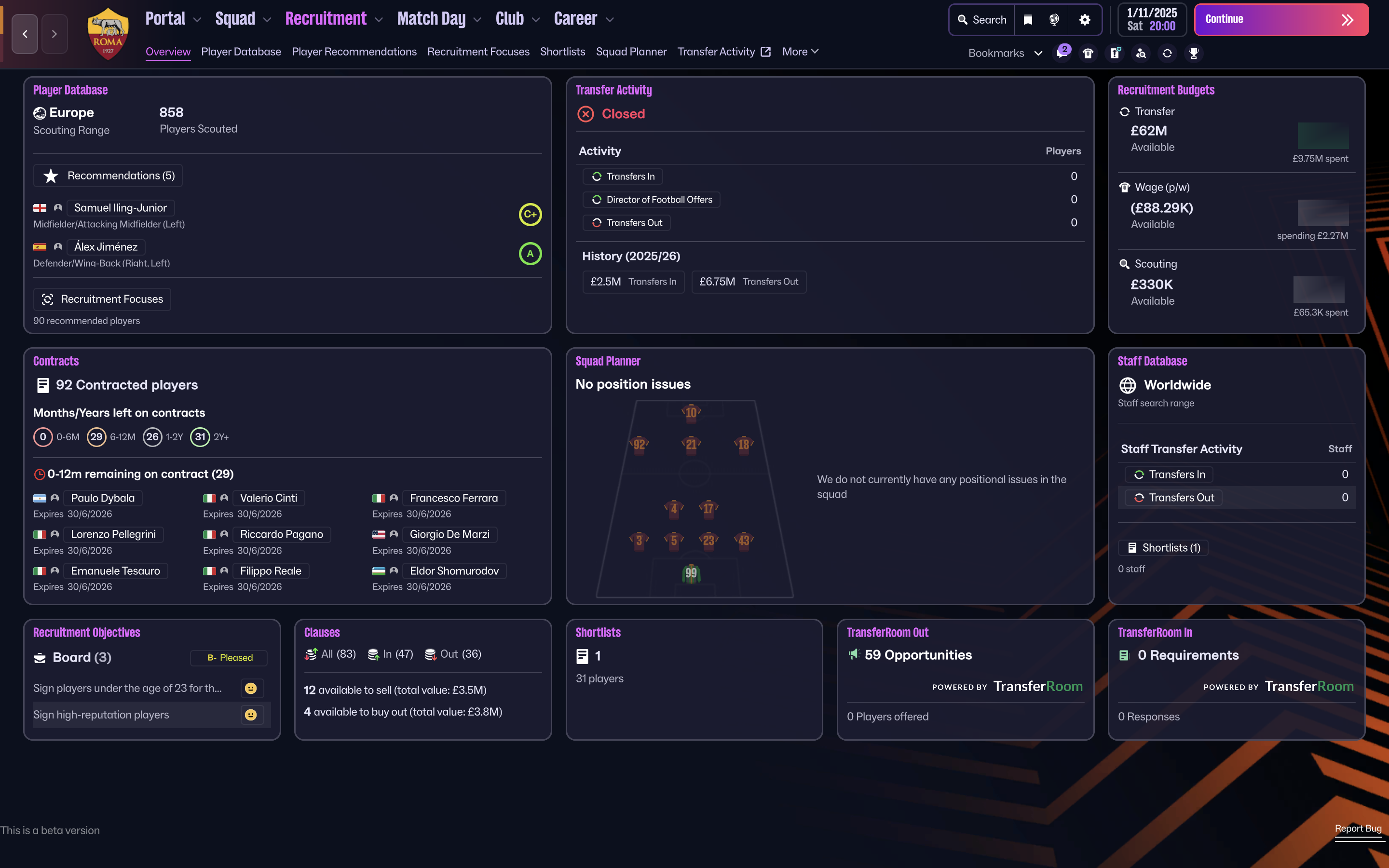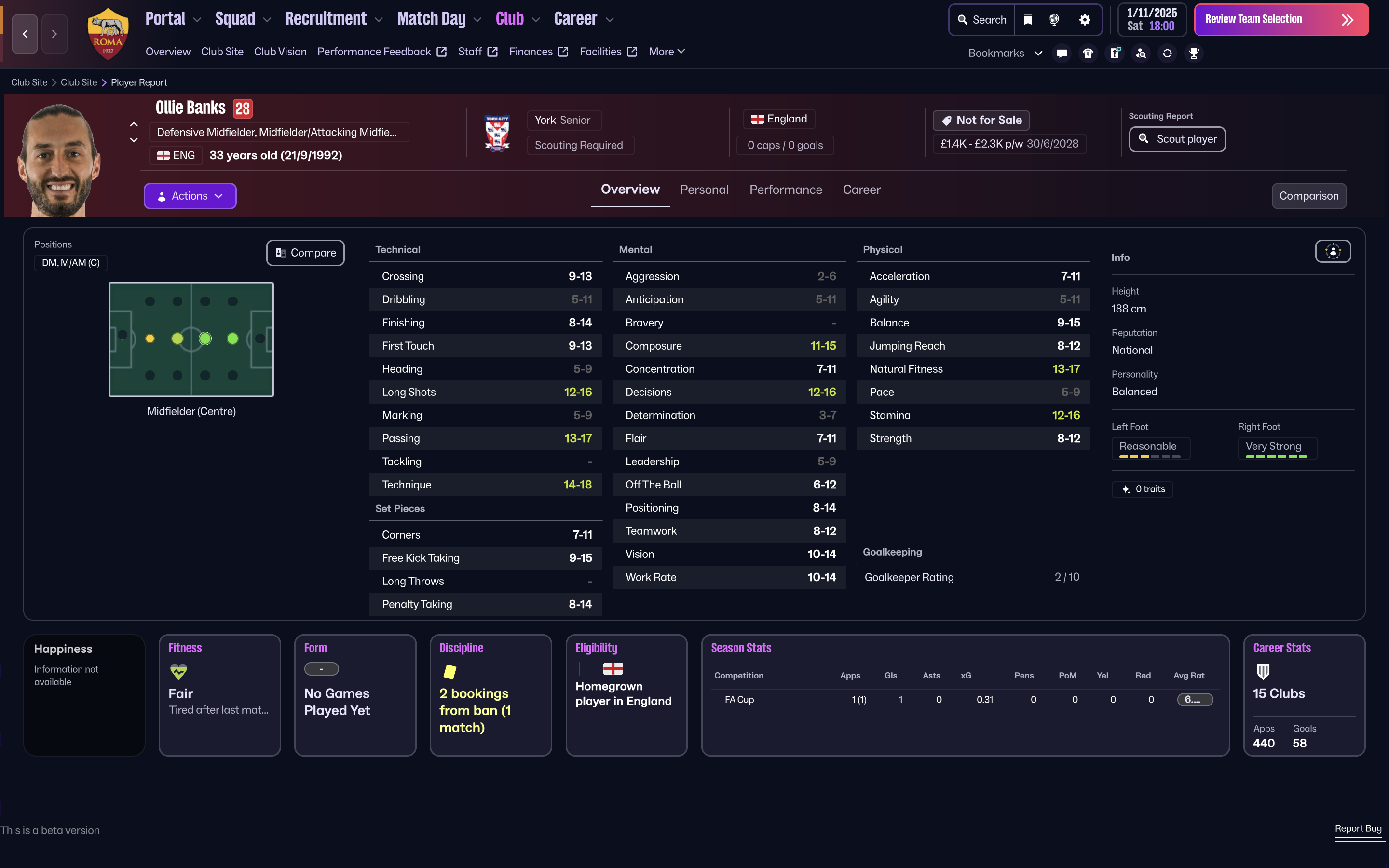Our Verdict
SI’s gap year was well spent on a fantastic match engine update, but progress is still too slow between games.
PC Gamer's got your back
How to improve Football Manager. It’s a question both Sports Interactive and players like me have asked on an (almost) yearly basis for the last 20 years. So the answers should, by rights, be forthcoming and straightforward. It’s a series that eats up vast, greedy swathes of your time, and in the hundreds of hours you spend with it each year, you become as familiar with its foibles as one might with a spouse. And yet the more time I spend with Football Manager 26, the most significant update to the old Collyer brothers’ formula for years, the more I’m stumped about what the right answer is to that question.
What is it? The most addictive mod for Microsoft Excel returns with a new match engine.
Release date November 4, 2025
Expect to pay $60/£50
Developer Sports Interactive
Publisher Sega
Reviewed on i7 9700K, RTX 2080 Ti, 16GB RAM
Steam Deck TBA
Link Official site
Is it a matter of making it a more technically impressive affair? Sports Interactive evidently think so. The London-based studio took a lot of heat for cancelling FM 25’s release last year in order to switch engines and deliver a more technically substantial update than has been customary. You’ve got to admire a developer who does that.
The result? Simply put, matches look more like real football. Now running in Unity, but most importantly with a deeper fidelity and variety of player animations in the match engine, FM 26 shows you details that weren’t there before. Alright, it doesn’t rival the Matrix Awakens demo for jaw-on-the-floor graphical heft, but it actually makes your job easier. Previously I might have looked at the player profile screen to decide which of my Roma left-backs made it into my starting XI, scanning for numbers approaching 20. Now it’s clear by actually watching Angelino and Tsimikas on the ball: the former is pacey and creative, full of deft touches and stepovers. The latter is functional and less adventurous in possession.
The newfound match engine fidelity definitely serves a gameplay need, then. My manager’s eye can better observe how well a team holds its shape out of possession, watch impact subs skin their markers with their fresher legs, and note when my centrebacks are pulled out of position. But the gamer in me just likes watching the cool goals go in. The spectacular moments feel dialled up in this revamped match engine, and that’s just as important.
Match fit
It’s funny how much more the extra detail has bonded me to my players, and how it’s told a distinct and compelling story in certain games. When it caught my star winger Matias Soule rolling around feigning injury, I felt disappointed in him. The way wonderkid Niccolo Pisilli repaid my faith in him by hammering in an absolute worldy from the edge of the box in a Europa League match against someone really normal like Midtjylland. These things bring out emotion. This is a good thing.
Showing you more of the match yields some big gameplay rewards in FM 26. The thing is, I’m not sure that same philosophy extends to the rest of the game. Among some more straightforwardly positive additions to this game, like 14 playable leagues from the women' s game and the men’s Premier League license, is a UI update, and it makes my brain hurt.
The intention of this redesign is to show you more information on each screen. SI probably thinks the benefits of this are twofold: less clicking between menus, and an at-a-glance overview of just how deep FM 26’s simulation goes, in order to create a real sense that there’s a living, breathing world of football beneath the numbers.
Keep up to date with the most important stories and the best deals, as picked by the PC Gamer team.
In practice, it’s like someone breaking into the home you’ve lived in for the last 15 years, rearranging everything and leaving incredibly detailed notes on all the cupboard doors about where all your stuff is now. If that seems unkind, it’s only because the UI was already overwhelming before, and this game seems to have doubled down on it while simultaneously disorienting me.
I’ve spent so much time scanning through extraneous information for the one stat I’m looking for, not because it’s not present in a particular menu, but because 9,000 other things are too. This Roma job’s not easy and the Italian press don’t tread lightly when you get a bad result away to Como. My patience for playing ‘guess where the menu you used to be able to navigate to lives now’ is wearing thin.
Look, it’s not a disaster. It’s functional enough and over time you do learn its ways. There’s even a bookmark system which lets you pin your most-used menus to the ‘portal’ page, a redesigned hub menu intended to work like your career save’s homepage. Ironically though, that bookmark section is sharing that portal’s real estate with such an absurd number of other elements that it’s easy to miss, and the icons are so small that it feels fiddlier to use them than to navigate to your intended menus the old school way.
Big data
And that makes me wonder whether the way to improve Football Manager might actually be to show the player less information, not more. There’s a passionate group, not insignificant in size, who’d tell you that the whole series peaked at Championship Manager 01/02. No match engine at all, far less detail, far fewer interaction types. Just a big database of players, an inbox, and some fairly basic tactics options. That might sound like rampant Luddism, but having played it back-to-back with FM 26, I think there’s something to the argument.
The joy to be found in this series, a genre unto itself really, is the way a world tends to build up around you the more you play. You start to develop imagined relationships with players, with rival managers, with the press. Stories start to form about plucky kids from the youth setup whom you gave a chance in the first team, dream transfer targets you court for years but never quite have the funds to secure, cup finals you lost on penalties and vow to one day win. But all of that happens only when enough time passes. And in modern FM, time simply passes too slowly.
In the first eight hours of my Roma save, I’d played four league games and a Europa League fixture. Some of that’s on me for spending so much time scouring the transfer market for young Brazilian left-sided wingers, but the game has to take the lion’s share of the blame for moving along at such a glacial pace between fixtures. No matter how many tasks you delegate to your backroom staff, no matter how many news event types you unsubscribe to, there always seems to be something insignificant popping up to stop the passage of time.
This is a philosophical problem, not a technical one. Sports Interactive would say it caters for those after a more classic FM experience with the ‘Touch’ editions of its newer games, but even they’re too laden with system-bloat to give the zippy career pace of earlier Champ Man titles.
Excel-lent
And yet here I am, still playing the damn thing, and still having loads of fun. Confound it. Before it was addictive because you had plans for the next season that you wanted to see out before bedtime. Now it’s simply that you want to make it to the next fixture. Frustrating as it is, that withholding way of FM 26’s does keep you engaged.
If you’re prepared to just go with it, FM 26’s depth of simulation is as impressive as the series has ever been. There are small reinforcements like searching for transfer deals via TransferRoom (basically Craigslist for footballers), and a tactics reworking that draws a clear line of delineation between how you set your team up in and out of possession, and they both work well to give you more granular control over two of the most important and satisfying components: buying and selling players, and making those players do what you tell them to on the pitch.
At present, it’s perhaps slightly too easy to exploit tactics that see your wingbacks wandering into the box rather than crossing at distance, but considering the magnitude of this year’s overhaul there don’t seem to be any glaring glitches or cheese tactics. It’s well-balanced, and the ability to set strikingly different shapes and player roles in and out of possession gives tactics creation a breath of fresh air.
But really, the strengths of FM 26 are the same strengths that the series has always relied on. The vast and detailed database of players and staff, and the way it simulates not just your poxy little club, but the entire rest of the world. You find yourself checking Ligue 1 results, knowing you will never ever take a job there. You eagerly await the World Cup so that you can watch the matches. That’s the marker of FM’s quality. You quite quickly come to believe that its simulated world of football is real, and worth poring over in forensic detail.
It is, if you’ll forgive an unforgivably tired cliche, a game of two halves. The revamped match day experience really was worth the wait, and shows you details that not only make you a pleased fan but a better informed manager too. Off the pitch, though, it continues to overload you with information and refuses to let time pass with any rapidity. The sum total is captivating, just like always, but often frustrating and exhausting too.
SI’s gap year was well spent on a fantastic match engine update, but progress is still too slow between games.
Phil 'the face' Iwaniuk used to work in magazines. Now he wanders the earth, stopping passers-by to tell them about PC games he remembers from 1998 until their polite smiles turn cold. He also makes ads. Veteran hardware smasher and game botherer of PC Format, Official PlayStation Magazine, PCGamesN, Guardian, Eurogamer, IGN, VG247, and What Gramophone? He won an award once, but he doesn't like to go on about it.
You can get rid of 'the face' bit if you like.
No -Ed.
You must confirm your public display name before commenting
Please logout and then login again, you will then be prompted to enter your display name.

